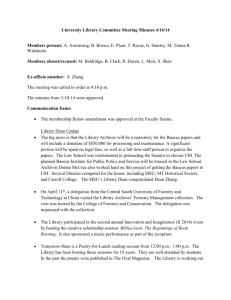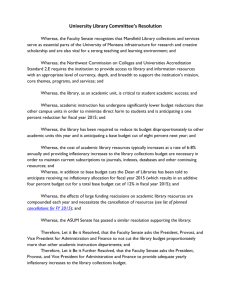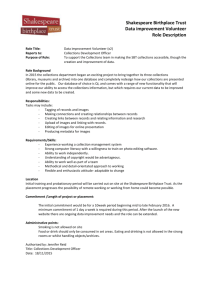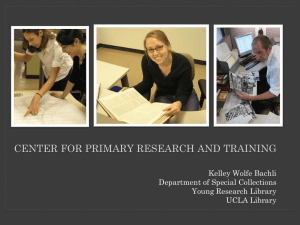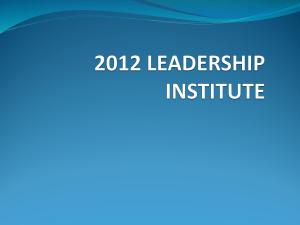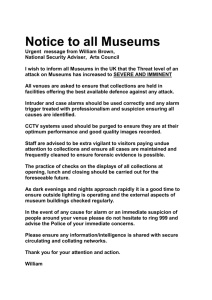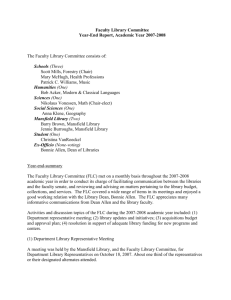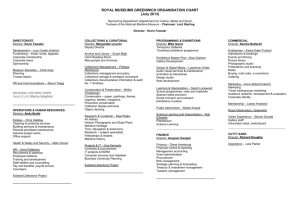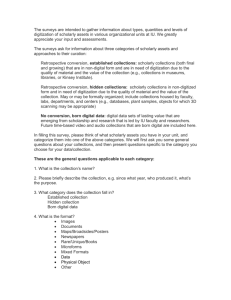University Library Committee Annual Report, 2013-2014
advertisement
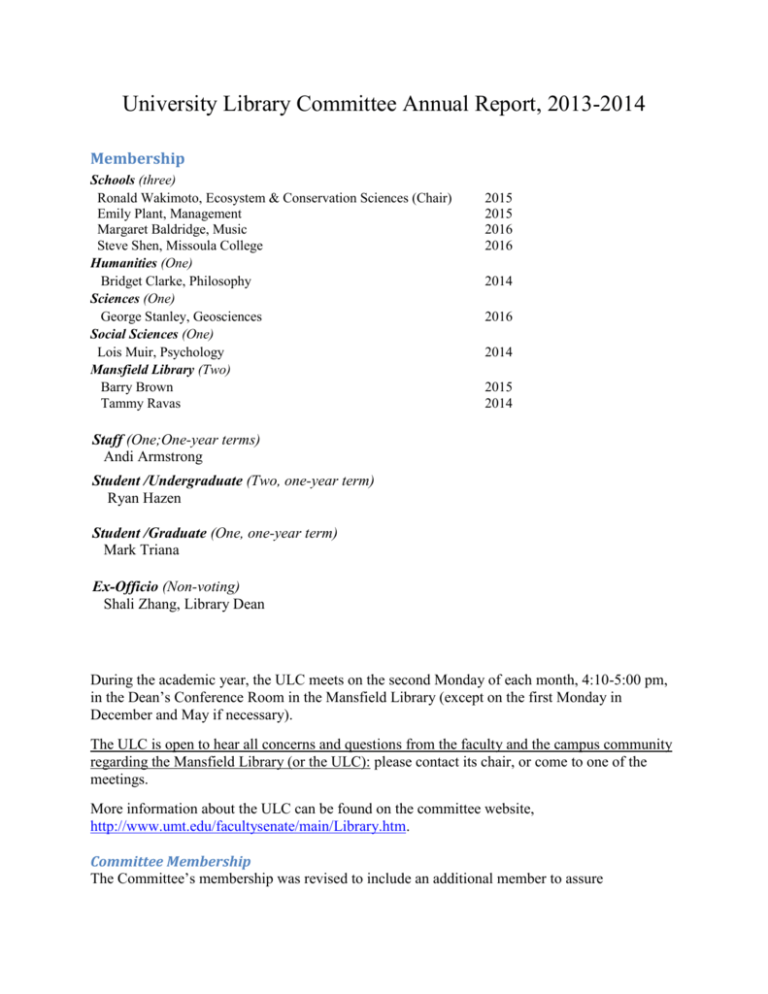
University Library Committee Annual Report, 2013-2014 Membership Schools (three) Ronald Wakimoto, Ecosystem & Conservation Sciences (Chair) Emily Plant, Management Margaret Baldridge, Music Steve Shen, Missoula College Humanities (One) Bridget Clarke, Philosophy Sciences (One) George Stanley, Geosciences Social Sciences (One) Lois Muir, Psychology Mansfield Library (Two) Barry Brown Tammy Ravas 2015 2015 2016 2016 2014 2016 2014 2015 2014 Staff (One;One-year terms) Andi Armstrong Student /Undergraduate (Two, one-year term) Ryan Hazen Student /Graduate (One, one-year term) Mark Triana Ex-Officio (Non-voting) Shali Zhang, Library Dean During the academic year, the ULC meets on the second Monday of each month, 4:10-5:00 pm, in the Dean’s Conference Room in the Mansfield Library (except on the first Monday in December and May if necessary). The ULC is open to hear all concerns and questions from the faculty and the campus community regarding the Mansfield Library (or the ULC): please contact its chair, or come to one of the meetings. More information about the ULC can be found on the committee website, http://www.umt.edu/facultysenate/main/Library.htm. Committee Membership The Committee’s membership was revised to include an additional member to assure representation from the Missoula College. The revision required an amendment to the Faculty Senate Bylaws. These were approved by the Faculty Senate on March 13th (appendix 1). Operations items Budget The committee was provided with the collections budget in October (appendix 2). Existing database and journal subscriptions were cut due to the FY 2014 budget reductions. Usage statistics were primarily used to determine which materials to cancel. Fiscal Year 2014 began with a library base budget reduction of $360,000 which was applied to the Collections Budget. Additionally, instead of receiving an expected inflationary increase of 8% to the Collections Budget there was an increase of less than 4%. This essentially resulted in an additional base reduction of $221,000. The impact of those reductions was communicated to the campus during the summer and early fall semester. In December there was a temporary freeze on the library’s purchasing, but it was lifted after a few days. In FY 2014, the library experienced additional one time only reductions of $363,876, including $277,000 from the Collections Budget (this came out of Digitization, Collection Utilities, and Monograph and Media acquisitions). Altogether, these reductions have resulted in a collections budget decrease of over 10% compared to the previous year. UM’s library collections budget is now substantially below MSU’s which it has historically been higher than. The library is also working to plan for next year’s budget cuts. The main cut will be from collections given the library’s small operating budget. Significant cancellations of existing resources will need to occur. The University Library Committee approved a resolution to take to the Faculty Senate at the May meeting requesting the administration not cut the library budget proportionately more than other academic instruction departments (appendix 3). Strategic Planning The library started its three-year strategic planning process in fall 2013. Strategic plan will assist the library to make strategic priorities which reflect the UM 2020 Strategic Goals, guide the library on numerous major initiatives to enhance services and programs to UM students and faculty, collaborate with campus units, libraries beyond the UM system, and better allocations of limited resources. During the process, UM students, faculty, staff, and administrators were invited to participate in the open orientation sessions, focus group sessions, and public presentation sessions throughout the process. The final version of the library’s Strategic Plan is available at (http://www.lib.umt.edu/files/STP-document-finaldraft_0.pdf) ScholarWorks The committee was provided with an information session on Scholar Works, a platform that stores, showcases and provides access to scholarly works by UM faculty and students including published articles, theses, dissertations, presentations, performances, and conferences. ScholarWorks serves as an institutional repository platform for UM. It optimizes the searchability and discoverability of the materials, provides reliable citations and monthly reports that show how often materials are viewed and downloaded. This platform was launched in fall 2013. Since then, over 8,000 items were made available to researchers worldwide who have douwnloaded papers over 50,000 times. Common MUS Discovery Tool An outcome of the State-wide Academic Library Symposium, an annual event organized by the UM and MSU libraries, was for campuses in the UM system including SKC, and St. Patrick Hospital to decide on the use of a common Discovery Tool for finding library resources. Both UM and MSU system libraries are implementing this new discovery tool since January 2014. The public access to the federated search platform will be available on July 1. The Deans of MSU and UM Libraries, representing good wills from each library system, collaborated on a joint legislative funding request for an integrated library system. It has been submitted to the Office of the Commissioner of Higher Education to be considered for the Board of Regents’ priorities for the legislative session in 2015. Three library faculty members were awarded grants. Dona McCrea, Head of Archives and Special Collections, received a $6,000 NIH grant to assist with preservation; Julie Edwards received a grant of $4,300 from Humanities Montana to bring a national exhibit to campus in October. There will be a press release and associated lectures. Karen Jaskar, Assistant Professor, was awarded IMLS funding to participate in Research Design in Librarianship at the Loyola Marymount University Library. Two issues of the library’s newsletter, Connections, have been published as a way to recognize donors since July 2013. The library has purchased new tables and chairs with gift funds for the Poetry Corner and the Theta Rho Room to create additional quite study space in response to student comments. There is a trend for students to work in groups and talk loud. The existing study rooms need upgrades so the sound does not carry. Outreach The library invited International Programs Office Director, Paulo-Zagalo-Melo and Disability Services for Students Director, Amy Capolupo to meet with the Library faculty and staff to discuss their services and how the library can better serve international students and students with disabilities. Director Paulo-Zagalo-Melo recommended a reference book to guide the library. The scanner has a function that adds Optical Character Recognition (OCR) to PDF documents. There are 600-800 veteran students at the University. The Library invited the Veteran’s Education and Transition Services Office (VETS Office) to present a panel, “Student veterans: Academic transitions & library services,” with discussion to help raise awareness and identify ways to better serve the veteran students. According to a recent survey the library is the second campus facility visited most often by student veterans. Sue Samson works with the VETS Office to provide information sessions to student veterans. The library invited a Native American Storyteller to help increase awareness and sensitivity when serving Native American Students. Events and Exhibits In February the library had exhibits located throughout the main level focused on the achievements of African Americans to celebrate African American History Month. The Library has both physical (Archives, level 4) and online “Women in Montana Politics” exhibits. There were two events related to the exhibits. On March 12thDian Sands, women’s history scholar and former Montana State representative gave a lecture and on March 26th the Leading the Way: Montana Woman Suffrage and the Struggle for Equal Citizenship". Exhibits opened with a UM Women’s Chorus performance. These events were entered on the University events calendar. On April 14th the library collaborated in hosting one of a 3 part session on Creative Research in conjunction with Innovation and Imagination activities coordinated by the Vice President of Research and Creative Scholarship. The library also sponsored a music performance at the reception of II 2014. The library participated in the 2014 Service Learning Colloquium on March 6th. Professor Stark gave a session on bridging academic information and service environment. Appendix 1 Faculty Senate Bylaw Amendment - University Library Committee 3/13/14 SECTION III. COMMITTEES A. Standing Committees of the Faculty Senate 5. University Library Committee a. Membership The University Library Committee consists of nine eight faculty members, three students, one member of the Staff Senate, and the Dean of the Libraries or the Dean's designee (exofficio and non-voting). Departmental library representatives are encouraged to participate on this Committee and shall be given nomination preference. One faculty member each shall be from the humanities, science, social science, and the Missoula College, two faculty members shall be from the Library Faculty, and three shall be chosen from the remaining professional schools. b. Responsibilities Communication: The University Library Committee (ULC) communicates between the Faculty Senate and the library administration. Advocacy: The ULC advocates on behalf of the development and maintenance of library resources and services as well as the needs of library stakeholders, including faculty, students and staff, especially as communicated through the Faculty Senate. Additionally, the committee reviews library matters as they relate to the University’s academic mission. Review: The ULC reviews the annual library acquisitions budget and strategic plan. The committee participates in the selection and periodic evaluations of the Dean of Libraries. The committee also participates in the accreditation processes affecting or involving the Mansfield Library. Rationale The University Library Committee is advisory to the Mansfield Library. It communicates, advocates, and reviews information with the needs of various stakeholders in mind. The Missoula College has a separate library location managed by the Mansfield Library. The Missoula College has a two –year mission and attracts a student population with different needs. A representative from the Missoula College will assure that these needs are represented during Committee discussions. ………………………………………………………………………………………. Appendix 2 Mansfield Library Collections Budget: FY2013 and FY2014 - Two Year Comparison (10/14/13) FY 2013 FY 2014 Total Materials Budget = $5,010,076 Total Materials Budget = $4,826,680 Collection Categories: Collection Categories Databases & Ejournals = $3,462,358 Databases & Ejournals = $3,349,434 Serials (paper subscriptions) = $231,360 Serials (paper subscriptions) = $237,752 Monographs & Media = $1,039,358 Monographs & Media = $905,188 Standing Orders = $119,880 Standing Orders = $81,688 Core Approval Plan = $300,000 Core Approval Plan = $220,000 Supplemental Fund = $228,528 Supplemental Fund = $182,400 Ebook Sub. & Econtent = $194,950 Ebook Sub. & Econtent = $245,100 Digitization Projects = Digitization Projects = $196,000 Collection Utilities = $272,000 Collection Utilities = $329,306 Binding = $5,000 Binding = $5,000 $176,000 …………………………………………………………………………………………………………………………………………………………….. Appendix 3 University Library Committee’s Resolution Whereas, the Faculty Senate recognizes that Mansfield Library collections and services serve as essential parts of the University of Montana infrastructure for research and creative scholarship and are also vital for a strong teaching and learning environment; and Whereas, the Northwest Commission on Colleges and Universities Accreditation Standard 2.E requires the institution to provide access to library and information resources with an appropriate level of currency, depth, and breadth to support the institution’s mission, core themes, programs, and services; and Whereas, the library, as an academic unit, is critical to student academic success; and Whereas, academic instruction has undergone significantly lower budget reductions than other campus units in order to minimize direct harm to students and is anticipating a one percent reduction for fiscal year 2015; and Whereas, the library has been required to reduce its budget disproportionately to other academic units this year and is anticipating a base budget cut of eight percent next year; and Whereas, the cost of academic library resources typically increases at a rate of 6-8% annually and providing inflationary increases to the library collections budget are necessary in order to maintain current subscriptions to journals, indexes, databases and other continuing resources; and Whereas, in addition to base budget cuts the Dean of Libraries has been told to anticipate receiving no inflationary allocation for fiscal year 2015 (which results in an additive four percent budget cut for a total base budget cut of 12% in fiscal year 2015); and Whereas, the effects of large funding rescissions on academic library resources are compounded each year and necessitate the cancellation of resources (see list of planned cancellations for FY 2015); and Whereas, the ASUM Senate has passed a similar resolution supporting the library; Therefore, Let it Be it Resolved, that the Faculty Senate asks the President, Provost, and Vice President for Administration and Finance to not cut the library budget proportionately more than other academic instruction departments; and Therefore, Let it Be it Further Resolved, that the Faculty Senate asks the President, Provost, and Vice President for Administration and Finance to provide adequate yearly inflationary increases to the library collections budget. Mansfield Library - Collections Budget – 3 Year Snapshot and Notes FY 2012 Allocation = $4,641,551 (includes 8% Inflationary Increase) No Rescissions Net Collections Budget = $4,641,551 Impacts: Maintained existing resources Added significant new resources Comparison: MSU Library Collections FY 2012 = $4.6 Million FY 2013 Allocation = $5,010,076 (includes 8% Inflationary Increase) Additional One Time Only Rescission of $141,544 after allocation Net Collections Budget = $4,868,532 Impacts: Maintained existing resources No new subscription resources added Comparison: MSU Library Collections FY 2013 = $4.9 Million FY 2014 Allocation = $4,826,680 (Base budget decrease of $360,000; plus less than a 4% Inflationary Increase) Additional One Time Only Rescission of $277,000 after allocation Net Collections Budget = $4,549,680 Impacts: No new subscription resources added Cancellation of some existing databases & journals (see list for FY 2014) Comparison: MSU Library Collections FY 2014 = $5.3 Million FY 2015 Allocation = $4,210,948 (Base budget decrease of $615,732; plus 0% Inflationary Increase) Notes: The total library budget for FY 2014 was $7,696,533. A base budget reduction for FY 2015 of $615,732 is 8% less. The expected 8% inflationary increase to the collections budget would be $336,000. The loss of the inflationary increase is an additional reduction of 4% for a total library base budget reduction of 12%. Impacts: • No new subscriptions or large electronic resource acquisitions • No new electronic journal backfiles • Large reduction of monograph and media acquisitions • Large reduction of digitization projects • Substantial reduction in the number of current databases & journals Comparison: Expected MSU Library Collections FY 2015 = $5.6 Million
